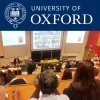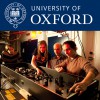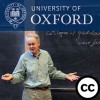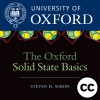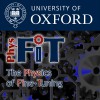Department of Physics

Relevant Links
Physics at Oxford aspire to be one of the best physics departments in the world by conducting cutting-edge research and by teaching and developing the careers of the next generation of physicists.
Physics work on major facilities worldwide, develop the most advanced experimental techniques and the most sophisticated theoretical methods to investigate nature at every scale.
Oxford University Physics Department pursues fundamental science and in doing so make discoveries that enable them to contribute directly to tackling the challenging problems facing society.
Series associated with Department of Physics
| # | Episode Title | Description | People | Date | |
|---|---|---|---|---|---|
| 322 | From Identical Particles to Frictionless Flow | John Chalker discusses how the laws of quantum mechanics lead us from the microscopic world to macroscopic phenomena. | John Chalker | 03 Nov 2017 | |
| 321 | Superconductors: Miracle Materials | An introduction to the fascinating world of superconductors and the many surprising phenomena they exhibit, from zero resistance to quantum levitation. | Andrew Boothroyd | 25 Oct 2017 | |
| 320 | Quantum physics and the nature of computing | How can we test a quantum computer? An exploration of some of the theoretical puzzles of this field and how we can investigate them with experimental physics. | Jelmer Renema | 25 Oct 2017 | |
| 319 | Superconductors: why it’s cool to be repulsive | A family-friendly demonstration of superconductors in action. Fran explores the low temperatures we need to make them work, and how we can use superconductors for levitating trains. | Fran Kirschner | 25 Oct 2017 | |
| 318 | Cassini-Huygens: Space Odyssey to Saturn and Titan | Public Lecture organised by the Aeronautical Society of Oxford in conjunction with the Department of Physics. | David Southwood | 18 Oct 2017 | |
| 317 | Observation of the mergers of binary black holes: The opening of gravitational wave astronomy | The 2017 Halley Lecture 7th June 2017 delivered by Professor Rainer Weiss, MIT on behalf of the LIGO Scientific Collaboration | Rainer Weiss | 27 Jun 2017 | |
| 316 | Ghost Imaging with Quantum Light | Physics Colloquium 26th May 2017 delivered by Professor Miles Padgett, University of Glasgow | Miles Padgett | 27 Jun 2017 | |
| 315 | Pulsars and Extreme Physics - A 50th Anniversary | Physics Colloquium 5th May 2017 delivered by Dame Professor Jocelyn Bell Burnell | Jocelyn Bell Burnell | 27 Jun 2017 | |
| 314 | Starquakes Expose Stellar Heartbeats | The 14th Hintze Biannual Lecture 4th May 2017 delivered by Professor Conny Aerts - Director, Institute of Astronomy KU Leuven | Connie Aerts | 27 Jun 2017 | |
| 313 | Exploring the very early universe with gravitational waves | John March-Russell gives a talk about gravitational wave signals of stringy physics, a ‘soundscape’ connected to the landscape of string vacua. | John March-Russell | 10 May 2017 | |
| 312 | The birth of gravitational wave astronomy | Subir Sarkar reviews the detection of the ‘chirrup’ signal from a pair of merging massive black holes by the Laser Interferometer Gravitational-Wave Observatory, as well as subsequent experimental developments. | Subir Sarkar | 10 May 2017 | |
| 311 | From action at a distance to gravitational waves | James Binney gives a talk about the mathematics that describe Gravitational waves. | James Binney | 10 May 2017 | |
| 310 | Curiosity’s Search for Ancient Habitable Environments at Gale Crater, Mars | 4th Annual Lobanov-Rostovsky Lecture in Planetary Geology delivered by Professor John Grotzinger, Caltech, USA | John Grotzinger | 27 Apr 2017 | |
| 309 | Spatio-temporal Optical Vortices | Physics Colloquium 10th March 2017 delivered by Professor Howard Milchberg, University of Maryland, USA | Howard Milchberg | 27 Apr 2017 | |
| 308 | Learning new physics from a medieval thinker: Big Bangs and Rainbows | Physics Colloquium 24 February 2017 delivered by Professor Tom McLeish FRS, Department of Physics and Institute for Medieval and Renaissance Studies, Durham University, UK | Tom McLeish | 27 Apr 2017 | |
| 307 | The applied side of Bell nonlocality | Physics Colloquium 17 February 2016 delivered by Professor Valerio Scarani | Valerio Scarani | 27 Apr 2017 | |
| 306 | The Beauty of Flavour - Latest results from the LHCb experiment at the Large Hadron Collider | Physics Colloquium 3 February 2017 delivered by Professor Val Gibson, Cambridge | Val Gibson | 05 Apr 2017 | |
| 305 | From Materials to Cosmology: Studying the early universe under the microscope | Physics Colloquium 27 January 2017 delivered by Professor Nicola Spaldin, ETH Zurich | Nicola Spaldin | 05 Apr 2017 | |
| 304 | The New Era in Observational Cosmology | In the fourth part of their discussion, Pedro Ferreira and Jerome Martin conjecture about the future of inflation. They talk about the potential for new evidence for and against the theory, and the variety of new probes into our cosmological environment. | Pedro Ferreira, Jerome Martin | 04 Apr 2017 | |
| 303 | When is a theory good enough? | In the third part of their discussion, Pedro Ferreira and Jerome Martin talk about whether one should look for a deeper physical theory when one’s current theory is well-supported by observation. | Pedro Ferreira, Jerome Martin | 04 Apr 2017 | |
| 302 | Can we measure naturalness? | In the second part of their discussion, Pedro Ferreira and Jerome Martin consider ways to build the naturalness of an inflationary model into our expectations for observing it. | Pedro Ferreira, Jerome Martin | 04 Apr 2017 | |
| 301 | An Encyclopedia of Inflation | In the first part of their discussion, Pedro Ferreira and Jerome Martin talk about the variety of inflationary models. They discuss methods for distinguishing between them based on evidence and describe the application of Bayesian statistics to inflation. | Pedro Ferreira, Jerome Martin | 04 Apr 2017 | |
| 300 | Inflation in the Future | What should we expect to learn in the future? In the fourth part of their chat, Dave Sloan and Robert Brandenberger talk about how we expect inflationary theory to develop, and how observations may lead to new physics in this area. | David Sloan, Robert Brandenberger | 04 Apr 2017 | |
| 299 | Strings, Inflation, and Alternatives | In the third part of their discussion, Dave Sloan and Robert Brandenberger explain the relationship between string theory and inflationary models. Can inflation arise from particle physics, or do we need to look for alternative models? | David Sloan, Robert Brandenberger | 04 Apr 2017 | |
| 298 | Inflation Predicts | In the second part of their discussion, Dave Sloan and Robert Brandenberger tell us what inflation predicts and whether inflation itself seems fine-tuned. This discussion was conducted at the University of Oxford on March 14, 2017. | David Sloan, Robert Brandenberger | 04 Apr 2017 | |
| 297 | Evidence For Inflation | In the first part of their discussion, Dave Sloan and Robert Brandenberger go over our evidence for inflationary theories and discuss how inflationary models improve on the hot big bang. | David Sloan, Robert Brandenberger | 04 Apr 2017 | |
| 296 | Panel on Inflation | Professor Joe Silk talks with Professor Robert Brandenberger, Professor Jerome Martin, and Dr. Dave Sloan about the current state of research and controversies surrounding inflation. | Joe Silk, Robert Brandenberger, Jerome Martin, David Sloan | 04 Apr 2017 | |
| 295 | Does Inflationary Cosmology Solve Fine-Tuning Problems? | Professor Robert Brandenberger (McGill) argues that inflationary models still face considerable challenges. | Robert Brandenberger | 04 Apr 2017 | |
| 294 | Inflationary Attractors | Dr David Sloan (Oxford) discusses the for inflation to occur given typical initial conditions. He argues that, on the right understanding of the background dynamics of the universe, inflationary conditions dominate. | David Sloan | 04 Apr 2017 | |
| 293 | Inflation After Planck | Professor Jerome Martin (Institut d’Astrophysique de Paris) explains the current state of evidence for inflationary models. | Jerome Martin | 04 Apr 2017 | |
| 292 | Redder is better! Exploring the universe with the successor to Hubble | Rebecca Bowler, University of Oxford give a talk about the successor to the Hubble telescope - The James Webb Space Telescope - which will detect infrared radiation. | Rebecca Bowler | 28 Mar 2017 | |
| 291 | Creative Commons | On the trail of the most energetic particles in the universe | Rafael Alves Batista, University of Oxford, gives a talk about cosmic rays. | Rafael Alves Batista | 28 Mar 2017 |
| 290 | Advanced LIGO: The Era of Gravitational Wave Astronomy | Dr Philipp Podsiadlowski, University of Oxford gives a talk about gravitational waves in light of the recent detections by the LIGO detector. | Philipp Podsiadlowski | 28 Mar 2017 | |
| 289 | Things that go bump in the night: Exploding stars and black holes | Professor Rob Fender, University of Oxford talks through some observations of black holes. | Rob Fender | 28 Mar 2017 | |
| 288 | The Future of Particle Physics Panel Discussion | Panel discussion with Prof John Womersley (STFC), Prof John Wheater (Department of Physics), Prof Ian Shipsey (Particle Physics), Prof Dave Wark (Particle Physics), Prof Daniella Bortoletto (Physics) and Prof Subir Sarkar (Particle Theory Group) | John Womersley, John Wheater, Ian Shipsey, Dave Wark | 07 Mar 2017 | |
| 287 | The Future of Particle Physics: The Particle Physics Christmas Lecture | Professor John Womersley (STFC) gives the Particle Physics Christmas Lecture. | John Womersley | 07 Mar 2017 | |
| 286 | Kilometres: Turbulence - Morning of Theroetical Physics | Fasten Your Seat Belts: Turbulent Flows in Nature. Turbulence is ubiquitous in nature, and it often causes us headaches both literal and metaphorical. | Michael Barnes | 28 Feb 2017 | |
| 285 | Microns: The bacterial viewpoint - Morning of Theroetical Physics | Ramin Golestanian will introduce you to Life at Low Reynolds number and ask how microorganisms can swim, navigate, and coordinate their activities. | Ramin Golestanian | 28 Feb 2017 | |
| 284 | Centimetres: Fluids all around us - Morning of Theroetical Physics | Julia Yeomans will talk about fluids and flows all around us: from superhydrophobic surfaces and how animals and plants keep dry, to bouncing droplets and balloons. | Julia Yeomans | 28 Feb 2017 | |
| 283 | The Observer Strikes Back | What is an observer? In the fifth and final part of their discussion, Jim Hartle and Bernard Carr discuss the nature of observers. | Jim Hartle, Bernard Carr | 06 Dec 2016 | |
| 282 | No Boundaries for Quantum Cosmology | Where is the observer in the universe? In the fourth part of their discussion, Jim Hartle and Bernard Carr discuss Jim Hartle’s no-boundary proposal. | Bernard Carr, Jim Hartle | 06 Dec 2016 | |
| 281 | Physics and Philosophy | What are the limits of physics? In the third part of their discussion, Bernard Carr and Jim Hartle talk about the point at which physics ends and philosophy begins. | Bernard Carr, Jim Hartle | 06 Dec 2016 | |
| 280 | The Quantum and Cosmological Scales | How do we combine our theory of the very small with our theory of the largest scales of the universe? In the second part of their discussion, Jim Hartle and Bernard Carr hash out the connections between cosmology and quantum mechanics. | Jim Hartle, Bernard Carr | 06 Dec 2016 | |
| 279 | What Fine Tunings Are There? | Is the universe fine-tuned for life? In the first part of their discussion, Bernard Carr and Jim Hartle discuss how physical theories might contain unexplained assumptions that are necessary for the existence of life. | Bernard Carr, Jim Hartle | 06 Dec 2016 | |
| 278 | Astronomy at the Highest Energies: Exploring the Extreme Universe with Gamma Rays | Physics Colloquium 25 November 2016 delivered by Dr Jamie Holder | Jamie Holder | 30 Nov 2016 | |
| 277 | Exotic combinations of quarks - A journey of fifty years | Physics Colloquium 11 November 2016 delivered by Professor Jon Rosner | Jon Rosner | 17 Nov 2016 | |
| 276 | Our Simple but Strange Universe | The 13th Hintze Biannual Lecture delivered by Professor David Spergel | David Spergel | 17 Nov 2016 | |
| 275 | Topology and the Classification of Matter: New Physics Hidden in Plain Sight | Third lecture "More is different" - how states of matter emerge from quantum theory Saturday morning of Theoretical Physics. With Professor Steve Simon, introduction by Professor John WheelerThird | Steve Simon | 01 Nov 2016 | |
| 274 | Magnets, superfluids and superconductors | Second lecture "More is different" - how states of matter emerge from quantum theory Saturday morning of Theoretical Physics. With Professor Fabian Essler, introduction by Professor John Wheeler. | Fabian Essler | 01 Nov 2016 | |
| 273 | Identical particles: from one to many | First lecture in the "More is different" - how states of matter emerge from quantum theory Saturday morning of Theoretical Physics. With Professor John Chalker, introduction by Professor John Wheeler. | John Chalker | 01 Nov 2016 | |
| 272 | Searching for - and finding! Gravitational Waves | Physics Colloquium 27th October 2016 delivered by Professor Gabriela Gonzalez | Gabriela Gonzalez | 01 Nov 2016 | |
| 271 | Visualizing Quantum Matter | Physics Colloquium 28 October 2016 delivered by Professor Séamus Davis | Séamus Davis | 01 Nov 2016 | |
| 270 | Atmospheric Circulation and Climate Change | Physics Colloquium 21st October 2016 delivered by Professor Theodore (Ted) Shepherd | Theodore (Ted) Shepherd | 01 Nov 2016 | |
| 269 | Creative Commons | The explosion mechanism of massive stars | Physics Colloquium 14th October 2016 delivered by Professor Thierry Foglizzo | Thierry Foglizzo | 27 Oct 2016 |
| 268 | Dark Matter, Fine-Tuned | What surprising features of our theories cry out for explanation? Rocky Kolb and Rafael Alves Batista consider features of our theories that look unlikely or unnatural, and what our chances are for building a unified theory that explains them. | Rocky Kolb, Rafael Alves Batista | 12 Oct 2016 | |
| 267 | Why Now? | We’re at a particularly interesting time in the evolution of the universe. Rafael Alves Batista and Rocky Kolb chat about the interesting features of our time, and why we should--or should not--expect to be living now. | Rocky Kolb, Rafael Alves Batista | 12 Oct 2016 | |
| 266 | Dark Matter Particles | What sort of things could dark matter be, and how would we tell which it is? Rafael Alves Batista and Rocky Kolb review the main candidate dark matter particles, and consider our chances for telling which one is out there. | Rocky Kolb, Rafael Alves Batista | 12 Oct 2016 | |
| 265 | The Future of Dark Matter | In the third part of their discussion, Celine Boehm and Justin Read mull over what we can learn from dark matter. Will understanding dark matter lead us to a small change in the standard model, or a large one? | Justin Read, Celine Boehm | 12 Oct 2016 | |
| 264 | How Does Dark Matter Act? | In the second part of their discussion, Celine Boehm and Justin Read talk about how dark matter acts, both on large scales, at early times, and in small galaxies much nearer to us. | Justin Read, Celine Boehm | 12 Oct 2016 | |
| 263 | How Do We Find Dark Matter? | In the first part of their discussion, Justin Read and Celine Boehm go over our evidence for dark matter and consider the possible particles that could make it up. | Justin Read, Celine Boehm | 12 Oct 2016 | |
| 262 | DMRG in Quantum Chemistry: From its relation to traditional methods to n-orbital density matrices and beyond | In my talk I will attempt to provide an overview on the application of the density matrix renormalization group (DMRG) algorithm in quantum chemistry. | Markus Reiher | 11 Oct 2016 | |
| 261 | (Almost) 25 Years of DMRG - What Is It About? | In this talk, I will introduce DMRG both from the historical (statistical) and modern (matrix product state) perspective, highlighting why it has become the method of choice for one-dimensional quantum systems in and out of equilibrium. | Ulrich Schollwöck | 11 Oct 2016 | |
| 260 | Openness of a Many-fermion Quantum System from the Generalized Pauli Principle | Information about the interaction of a many-electron quantum system with its environment is encoded within the one-electron density matrix (1-RDM). | Romit Chakraborty | 11 Oct 2016 | |
| 259 | Generalized Pauli Constraints in Reduced Density Matrix Functional Theory | Reduced Density Matrix Functional Theory is a method that relies on the 1-1 correspondence between the ground state wavefunction of many electron systems and the first order reduced density matrix(1RDM) and uses the second one as its fundamental valuable. | Iris Theophilou | 11 Oct 2016 | |
| 258 | Quasipinning and Extended Hartree-Fock Method based on Generalized Pauli Constraints | It is now known that fermionic natural occupation numbers (NON) do not only obey Pauli’s exclusion principle but are even stronger restricted by the so-called generalized Pauli constraints (GPC). | Carlos Benavides-Riveros | 11 Oct 2016 | |
| 257 | Fermionic Exchange Symmetry: Quantifying its Influence beyond Pauli’s Exclusion Principle | The Pauli exclusion principle has a strong impact on the properties and the behavior of most fermionic quantum systems. Remarkably, even stronger restrictions on fermionic natural occupation numbers follow from the fermionic exchange symmetry. | Felix Tennie | 11 Oct 2016 | |
| 256 | Pinning of Fermionic Occupation Numbers | The Pauli exclusion principle is a constraint on the natural occupation numbers of fermionic states. | Matthias Christandl | 11 Oct 2016 | |
| 255 | Calculation Of Generalized Pauli Constraints | In the talk I am planning to explain two different solutions of N-representability problem and then give the algorithm to calculate GPCs. | Murat Altunbulak | 11 Oct 2016 | |
| 254 | Derivation of the time-dependent Hartree(-Fock)-equation | In the talk I will present recent progress in proving closeness of the microscopic and effective description for systems of many fermions. | Peter Pickl | 11 Oct 2016 | |
| 253 | Physical Meaning of Natural Orbitals and Natural Occupation Numbers | Physical Meaning of Natural Orbitals and Natural Occupation Numbers | Nicole Helbig | 11 Oct 2016 | |
| 252 | Introduction and Overview of the Reduced Density Matrix Functional Theory | In this presentation, we review the theoretical foundations of RDMFT the most successful approximations and extensions, we assess present-day functionals on applications to molecular and periodic systems and we discuss the challenges and future prospect | Nektarios N. Lathiotakis | 11 Oct 2016 | |
| 251 | Quantum Marginal Problem and Generalized Pauli Constraints | I will give an introduction to the univariate quantum marginal problem using an elementary mathematical point of view. In particular, I will explain how extremality of the local spectrum carries structural information about the global wave function. | David Gross | 11 Oct 2016 | |
| 250 | Two-electron Reduced Density Matrices in Quantum Chemistry and Physics | Strongly correlated quantum systems are not easily described with conventional quantum chemistry formalism because the number of non-negligible configurations grows exponen- tially with the number of orbitals actively participating in the correlation. | David A. Mazziotti | 11 Oct 2016 | |
| 249 | Entanglement Spectroscopy and its application to the fractional quantum Hall phases | In this talk, we will give an overview of the entanglement spectroscopy with a focus on to the fractional quantum Hall phases. | Nicolas Regnault | 11 Oct 2016 | |
| 248 | Why should anyone care about computing with anyons? | In this talk Jiannis Pachos discusses a variety of different topics starting from characterizing knot invariants, their quantum simulation with exotic particles called anyons and finally the possible realization of anyons in the laboratory. | Jiannis Pachos | 11 Oct 2016 | |
| 247 | Quantum Geometry, Exclusion Statistics, and the Geometry of "Flux Attachment" in 2D Landau levels | Duncan Haldane talks about Quantum Geometry, Exclusion Statistics, and the Geometry of "Flux Attachment" in 2D Landau levels. | Duncan Haldane | 11 Oct 2016 | |
| 246 | Exchange symmetry and anyon virial coefficients | This talk mentions some aspects of the theory of identical particles, for example, treating neutrons and protons as identical particles distinguished by a quantum number called isotopic spin. | Jan Myrheim | 11 Oct 2016 | |
| 245 | Exchange statistics - Basic concepts | In this talk Jon Magne Leinaas from University of Oslo reviews some of the basic ideas and questions related to the exchange symmetry of identical particles. | Jon Magne Leinaas | 11 Oct 2016 | |
| 244 | Dark Matter(s) Discussion | Celine Boehm, Rocky Kolb, and Justin Read discuss fine-tuning in dark matter models, how we judge astrophysical parameters to be fine-tuned, how we get evidence for dark matter, supersymmetry, and our prospects for finding the dark matter particle. | Celine Boehm, Rocky Kolb, Justin Read | 04 Oct 2016 | |
| 243 | The Level of Fine-Tuning it Takes to Make a Dark Matter Model | Dr. Celine Boehm (Durham) discusses the possible dark matter particles and the constraints--theoretical and experimental--on their parameter space. | Celine Boehm | 04 Oct 2016 | |
| 242 | The Decade of the Wimp | Dr. Rocky Kolb (Chicago) discusses the theoretical reasons to expect dark matter to be a Weakly Interacting Massive Particle (WIMP), and the prospects for finding one. | Rocky Kolb | 04 Oct 2016 | |
| 241 | Astrophysical Probes of Dark Matter | Dr. Justin Read (Surrey) explains the astrophysical evidence for dark matter, and our prospects for getting more information about its nature and interaction by looking at nearby dwarf galaxies. | Justin Read | 04 Oct 2016 | |
| 240 | New Frontiers in Cosmology | In the fourth part of their discussion, Joe Silk and John Peacock conjecture about future developments in cosmology. What part of cosmology is most likely to be fruitful? This discussion was conducted at Trinity College, Oxford, on May 12, 2016. | John Peacock, Joe Silk | 13 Jul 2016 | |
| 239 | Dark Energy and the Multiverse | In the third part of their discussion, Joe Silk and John Peacock consider approaches to dark energy. Should we accept the multiverse, or wait for a theory of quantum gravity? | John Peacock, Joe Silk | 13 Jul 2016 | |
| 238 | New Data and New Work | In the second part of their discussion, Joe Silk and John Peacock discuss possible future sources of data and developments in cosmology. They conjecture about the search for dark matter and its impact on astronomy. | John Peacock, Joe Silk | 13 Jul 2016 | |
| 237 | New Statistics and Prediction | In the first part of their discussion, Joe Silk and John Peacock compare approaches to statistics and how these bear on predictions in cosmology, including Weinberg’s prediction of the cosmological constant. | John Peacock, Joe Silk | 13 Jul 2016 | |
| 236 | Practical Fine-Tuning | In the fourth part of their discussion, Luke Barnes and David Sloan look for ways the fine-tuning problems can lead to advances in physics. | Luke Barnes, David Sloan | 13 Jul 2016 | |
| 235 | Comparing Theories | In the third part of their discussion, Luke Barnes and David Sloan puzzle over the way we compare theories, and whether there can be a theory that doesn’t have some unexplained posits. | Luke Barnes, David Sloan | 13 Jul 2016 | |
| 234 | New Approaches to Probability | In the second part of their discussion, Luke Barnes and David Sloan go over the difference between frequentist and bayesian statistics, and how this difference applies to astrophysics and cosmology. | Luke Barnes, David Sloan | 13 Jul 2016 | |
| 233 | What Is Fine-Tuning? | In the first part of their discussion, Luke Barnes and David Sloan come up with a working understanding of fine-tuning. They also discuss various examples of fine-tuning in physics. This discussion was conducted at Trinity College, Oxford, on May 13, 2016 | Luke Barnes, David Sloan | 13 Jul 2016 | |
| 232 | Creative Commons | Quantum Sensors sans Frontier | Physics Colloquium 10th June 2016 delivered by Professor Swapan Chattopadhyay | Swapan Chattopadhyay | 16 Jun 2016 |
| 231 | Creative Commons | The Origins and Evolution of Exoplanet Atmospheres and Oceans | 3rd Annual Lobanov-Rostovsky Lecture in Planetary Geology delivered by Professor Raymond T Pierrehumbert. | Raymond T Pierrehumbert | 15 Jun 2016 |
| 230 | The 3rd Workshop in the Physics of Fine Tuning-discussion | The 3rd Workshop in the Physics of Fine Tuning - Stars, Galaxies, and the Multiverse, audience and panel discussion | John Peacock, Joe Silk, Adrianne Slyz | 27 May 2016 | |
| 229 | How do Galaxies know when, where and how quickly to form stars? | The 3rd Workshop in the Physics of Fine Tuning - Stars, Galaxies, and the Multiverse, Adrianne Slyz (Oxford) talks about How do Galaxies know when, where and how quickly to form stars? | Adrianne Slyz | 27 May 2016 | |
| 228 | The Limits of Cosmology | The 3rd Workshop in the Physics of Fine Tuning - Stars, Galaxies, and the Multiverse, Joe Silk (Oxford, IAP; John Hopkins) talks about The Limits of Cosmology | Joe Silk | 27 May 2016 | |
| 227 | Observer Selection and Fine-Tuning Puzzles in Cosmology | The 3rd Workshop in the Physics of Fine Tuning - Stars, Galaxies, and the Multiverse, John Peacock (Edinburgh) talks about Observer Selection and Fine-Tuning Puzzles in Cosmology | John Peacock | 27 May 2016 | |
| 226 | String Theory, Holography and Quark-Gluon Plasma | Members of the Rudolf Peierls Centre for Theoretical Physics hosted the ninth Saturday Morning of Theoretical Physics on 21st May 2016. Talk 3 by Dr Andrei Starinets. | Andrei Starinets | 24 May 2016 | |
| 225 | String Theory and Particle Physics | Members of the Rudolf Peierls Centre for Theoretical Physics hosted the ninth Saturday Morning of Theoretical Physics on 21st May 2016. Talk 2 by Professor Andre Lukas. | Andre Lukas | 24 May 2016 | |
| 224 | String Theory: Then and Now | Members of the Rudolf Peierls Centre for Theoretical Physics hosted the ninth Saturday Morning of Theoretical Physics on 21st May 2016. Talk 1 by Professor Joseph Conlon. | Joseph Conlon | 24 May 2016 | |
| 223 | Creative Commons | Bionic Hearing: the Science and the Experience | Physics Colloquium 20th May 2016 delivered by Ian Shipsey | Ian Shipsey | 24 May 2016 |
- ‹ previous
- 2 of 5
- next ›


